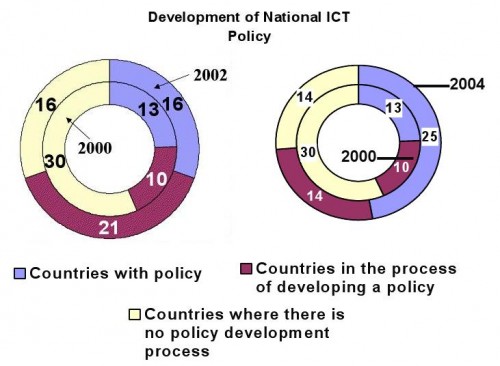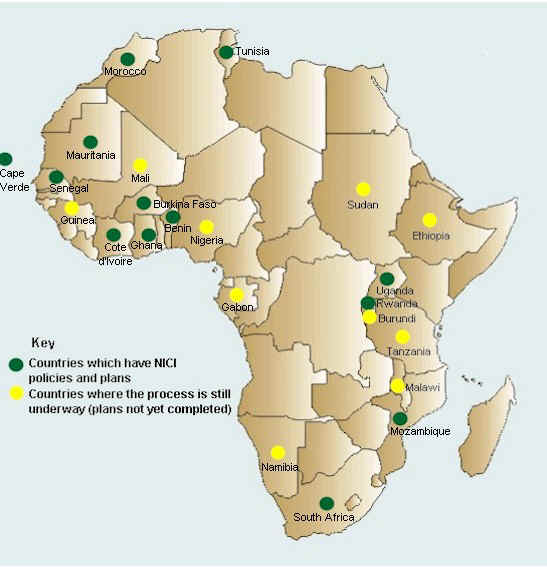Updated: African Nations with Active National ICT Plans
Last updated: January 2012. Twenty-six African nations appear to have a recent/current ICT plan. Approximately 60% of these plans are official active through at least 2011.
The successful implementation of a national ICT (NICT) plan, also known as national information and communication infrastructure (NICI) plan, requires a great deal of planning on the part of the government. National ICT plans face an array of challenges including costs, stubborn government leaders, lack of infrastructure (ie. electricity), and a limited number of trained consultants. The initial process of deciding to create a plan, researching the best options for a plan, collaborating with experts and leaders, and approving the plan often takes years in itself. At that time, the country is perhaps in a different social and economic state. Plus, the government may or may not have seen drastic shifts in power. Additionally, if a plan is enacted, it can lose government support, face corruption, or lack adequate funding. For example, an article by Sylvester Ngoma describes the challenges faced in the Congo.
During the 1999-2006 period, most nations either had a plan or were in the early stages of developing an ICT plan. In 2000, thirteen countries had NICI policies and plans while ten countries were in the process of designing NICI policies and plans. To see the plans of African nations between 1999 and 2006, head over to the NICI Country Pages created by the Economic Commission for Africa – once home to the most up-to-date information on Africa’s dynamic NICI scene. For historical documents and other secondary sources, browse the vast amount of information at the ICT Observatory. A UNECA PowerPoint showing the NICI status of each African country is available as well.

National ICT plan progress, 2000-2004. Note the 56% increase in # of countries with finalized policy between 2002 and 2004. Click to enlarge. {UNECA}
Years later, however, the number of African nation with active ICT plans remains much the same as it did in 2004. Many nations still do not have an official government-approved plan. Other countries have seen success, but the status of their NICT plan remains difficult to pinpoint. Moreover, many of the nations that once had active national plans have failed to update, re-evaluate, or re-emphasize their plans. A plan that functioned in 1999 will not necessarily yield the same results in 2011 due to the changing technological landscape (think social media, mobile, and broadband). Accordingly, a nation with an ICT plan is not necessarily a nation with an active ICT plan.
Below you will find a list of African nations with relatively current and well-publicized ICT plans. Plans that are known to be current within the past 3 years have the greatest chance at still being effective. Although 42 nations technically have national ICT plans, fewer have modern ones. 6 countries have not yet initiated the process in the formulation of ICT policies include Equatorial Guinea, Eritrea, Guinea-Bissau, Libya Arab Jamahiriya, Sao Tome and Principe and Somalia.
Angola:
- Strategy for The Development of Information technology 2000-2010
- Status unsure
- http://www.uneca.org/aisi/nici/Angola/angola.htm
Benin:
- National Vision for 2025
- National ICT plan, 2000-2004, goal to make socio-economic progress
- 2007 Plan with goals through 2015
Burkina Faso:
- Council of Ministers approved a plan lasting from 2000 through 2004, and another plan through 2006
- http://www.observatoiretic.org/documents/show/161
Botswana:
- National: 2007-2016, grow the ICT industry, make Botswana a regional ICT hub, 6-step plan: e-government, education innovation, e-health, legal framework, tech infrastructure
- http://www.ist-africa.org/home/default.asp?page=doc-by-id&docid=2890
- http://ifap-is-observatory.ittk.hu/node/421
Cameroon:
- National: 2006-?, a ten-pronged plan that took a full 6 years to develop and submit to the government
- http://www.uneca.org/AISI/nici/Cameroon/cameroon.htm
Central African Republic:
- National: 2006, long-term (2030)
- http://www.observatoiretic.org/documents/show/108
Chad:
- National: 2007, general infrastructure plan
- http://www.uneca.org/AISI/NICI/Chad/Plan%20NICI_Tchad.pdf
Egypt:
- National: 2005-Present, a very elaborate plan focused on infrastructure and governance of ICT networks
- http://www.mcit.gov.eg/ict_sector.aspx
Gambia:
- ICT4D 2020 Plan approved in 2008 as part of larger Vision 2020 initiative
- NICI plan had been adopted in 2004
- http://africa.gm/africa/gambia/banjul/article/2008/9/1/gambia-nici-implementation-plan-adopted
Ghana:
- National: 2005-Present
- http://www.ict.gov.gh/
Kenya:
- Kenya ICT Board
- Kenya ICT Action Network
- http://www.ict.go.ke/
- http://www.kictanet.or.ke/
Liberia:
- Policy as of June 2011
- Liberia Telecommunications Authority
Malawi:
- National: 2009 (final draft)
- http://www.malawi.gov.mw/ict_policy.pdf
Mauritania:
- National: Process started in 1999, completed in 2000 with an end date of 2002
- Goals were e-governance and the democratization of ICT
- Ministry devoted to promotion of ICT continues on
- http://www.uneca.org/AISI/NICI/Documents/Mauritanie_NICI_PLan.html
Mauritius:
- National: 2007-2011, goal is to make the ICT sector a main pillar of the economy
- http://www.gov.mu/portal/site/telcomit/?content_id=bdcf551cf8b86110VgnVCM1000000a04a8c0RCRD
Morocco:
- National: 2006-2012, original plan from 1999-2005
- Encourages education, governance, private sector development, e-commerce and access
- http://www.apebi.org.ma/apebi_eng.php?id_article=536&id_rubrique=37
Nigeria:
- National draft: 2012
- Aims to fully integrate information and communications technology into the socio-economic development and transformation of Nigeria into a knowledge based economy
- http://www.commtech.gov.ng/downloads/National_ICT_Policy_DRAFT_090112.pdf
Rwanda:
- National: 2001-2002-2020, four 5-year National Information and Communications Infrastructure Plans, currently in phase three: service deployment
- http://www.rita.gov.rw/laws/nici_plans.html
Senegal:
- Vision: A plan is in the works, but currently Senegal has an ICT vision in place with a goal of 2015
- Document for Accelerated Growth Strategy devised in 2007 with 10 digital projects
- http://unpan1.un.org/intradoc/groups/public/documents/cpsi/unpan042130.pdf
Seychelles:
- National: 2007
- http://www.ict.gov.sc/resources/policy.pdf
Sierra Leone:
- Advisory body launched: 2011
- http://news.sl/drwebsite/publish/article_200517080.shtml
South Africa:
- Various ministries, plans, and initiatives have existed since 1996
- A 2015 ICT Vision is in place
- http://www.ist-africa.org/home/default.asp?page=doc-by-id&docid=3576
Swaziland:
- National: 2008 (draft)
- http://www.gov.sz/home.asp?pid=4322
Tunisia:
- A 10-year plan was established in 2005
- The aim is to create an information society
- http://unpan1.un.org/intradoc/groups/public/documents/UN-OTHER/UNPAN020179.pdf
Uganda:
- National draft, 2008.
- High level dialogue had been on and off from 1997-2000, limited policy in 2003, final report in 2006
- http://www.observatoiretic.org/documents/show/356
Zimbabwe:
- National: 2010-2014 (waiting for approval), plan would promote research and development of ICT, infrastructure, education, cyber security
- http://www.africa-investor.com/article.asp?id=6439
Download an export of national ICT plans by nation from the ICT Observatory. XLS
For the “why and how” of NICI, read this article from UNECA, written in 1999.














 Twitter
Twitter Facebook
Facebook Pinterest
Pinterest
This is a great resource – thanks for compiling it
Thank you so very much for putting this together. And thank you so much for including my site, Nigerian Curiosity on your blogroll. Much appreciated.
Off to send out a tweet about this post.
Thanks! It’s difficult to organize all of the information out there!
[…] good friends at Online Africa have published a list of African NICI status with this commentary: During the 1999-2006 period, most nations either had a plan or were in the […]